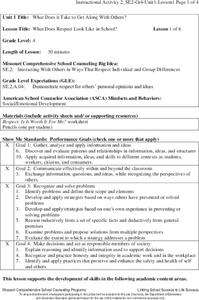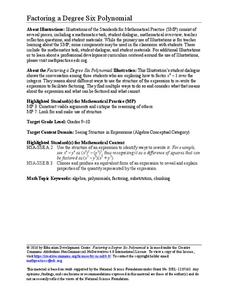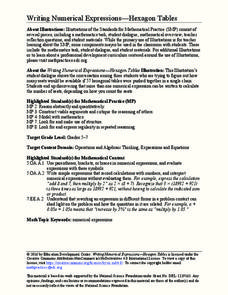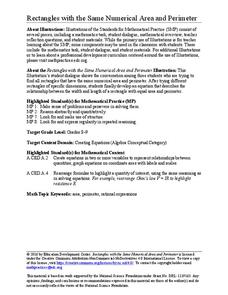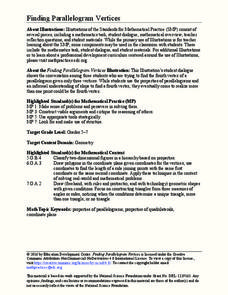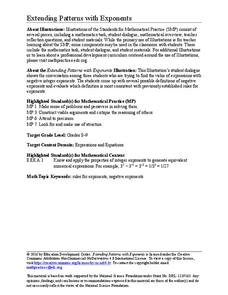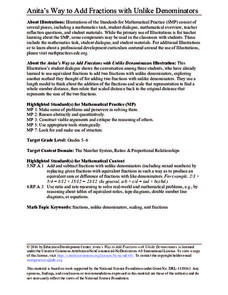Mikva Challenge
Why Vote?
Elections are supposed to represent the will of the people. So why don't 100% of registered voters line up at the polls on Election Day? High schoolers study the last few elections and the voter turnout for each, according to race,...
PBS
WWII: Detained
Imagine being forced against your will behind barbed wire for doing nothing but being yourself. Scholars investigate the impact Japanese-American internment camps had during World War II. Through video and archival evidence, they create...
Missouri Department of Elementary
What Does Respect Look Like in School?
What does it mean to be respectful? Scholars complete a self-assessment worksheet to determine just how respectful they are. Next, they choose three items from the survey and write plans for how to improve in those areas.
BioEd Online
Muscle Fibers
What better way to learn about muscle than by dissecting one? Using cow muscle (beef), learners compare bundles of yarn to muscle fibers as they explore each. The supplemental reading about astronauts losing muscle mass in space and what...
BioEd Online
Skeletal Structures
What better way to study the structures of organisms than by creating a new being? After considering different types of skeletal supports (exoskeleton and endoskeleton), budding biogeneticists work together to create their own animals -...
Baylor College
Your Energy Needs (BMR)
How many Calories one needs on a daily basis is dependent on a number of factors including gender, height, and activity level. In the third of seven lessons about energy and food, young nutritionists calculate the number of Calories...
Curated OER
Primary Source Analysis: 95 Theses Excerpts
By reviewing and analyzing these nine selected points from Martin Luther's 95 Theses, your young historians will discern the major tenets of the revolutionary challenge made against the Catholic Church in the seventeenth century. This is...
Education Development Center
Making Sense of Unusual Results
Collaboration is the key for this equation-solving lesson. Learners solve a multi-step linear equation that requires using the distributive property. Within collaborative groups, scholars discuss multiple methods and troubleshoot mistakes.
Education Development Center
Factoring a Degree Six Polynomial
Within collaborative groups, scholars factor a degree six polynomial. They can factor the polynomial using many different strategies — a great way to prompt mathematical discussion.
Education Development Center
Writing Numerical Expressions—Hexagon Tables
Explore a basic pattern to practice writing expressions. In collaborative groups, learners examine a contextual pattern and write an expression to model it. The task encourages groups to describe the pattern in multiple ways.
Education Development Center
Rectangles with the Same Numerical Area and Perimeter
Is it possible for a rectangle to have the same area and perimeter? If you disregard units, it happens! In a challenging task, groups work to determine the rectangles that meet these criterion. The hope is that learners will naturally...
Education Development Center
Consecutive Sums
Evaluate patterns of numbers through an engaging task. Scholars work collaboratively to determine a general rule reflecting the sum of consecutive positive integers. Multiple patterns emerge as learners explore different arrangements.
Education Development Center
Rational Exponents
It's rational to root for your class to learn about exponents. Scholars study rational exponents by reading a fictional dialogue between classmates. They analyze the conversation to understand the connection between rational exponents...
Education Development Center
Finding Parallelogram Vertices
Four is the perfect number—if you're talking about parallelograms. Scholars determine a possible fourth vertex of a parallelogram in the coordinate plane given the coordinates of three vertices. They read a conversation...
Education Development Center
Extending Patterns with Exponents
Don't think negatively about exponents. Young mathematicians dissect a fictional conversation between pupils trying to evaluate an expression with a negative exponent. This allows them to understand the meaning of negative exponents.
Education Development Center
Sum of Rational and Irrational is Irrational
Sometimes the indirect path is best. Scholars determine whether the sum of a rational number and an irrational number is irrational. Reading a transcript of a conversation between classmates leads to an indirect proof of this concept.
Howard County Schools
Maria’s Quinceañera
How long will it take to save up for a car? Classmates use linear and exponential models to see how money received during a Quinceanera will grow over time.
Southern Poverty Law Center
Analyzing Gender Stereotypes in Media
Why might toy advertisers use gender stereotypes to sell their products? Young people think critically about media messages and its role in gender stereotyping with a thought-provoking lesson plan.
Education Development Center
Word Problem with Rational Numbers—Balancing Bars of Soap
Here's a resource teachers won't want to wash their hands of. Given a task where a full bar of soap is on one side of a balance and 3/4 of a bar of soup and a 3/4-ounce weight is on the other side, young mathematicians must determine the...
Education Development Center
Anita's Way to Add Fractions with Unlike Denominators
Could you develop your own way to add fractions with unlike denominators? An in-depth task has scholars examine a fictional conversation between several people in which they discuss a method of adding fractions with unlike denominators....
Curated OER
My Antonia: What Do You Think about Reading?
How do your pupils feel about reading? Hand out this survey to find of if your students read often, enjoy reading, talk about what they read, and more.
All for KIDZ
Building Relationships: The Orphan of Ellis Island
Family and friendship are two very important themes of the historical fiction novel The Orphan of Ellis Island by Elvira Woodruff. From video clips and writing prompts to reader's theater and family interviews, this resource...
National Park Service
Making Choices
What factors go into a decision to enter a war? Use a collection of primary source documents and images to prompt a discussion about the American Revolution and the reasons for entering a war against Britain.
Novelinks
The Martian Chronicles: Fishbowl Discussion
Ray Bradbury's The Martian Chronicles provides the text for a fishbowl activity. Class members to sit in concentric circles, with the center circle discussing the topics from the book, and the outer circle observing the...


